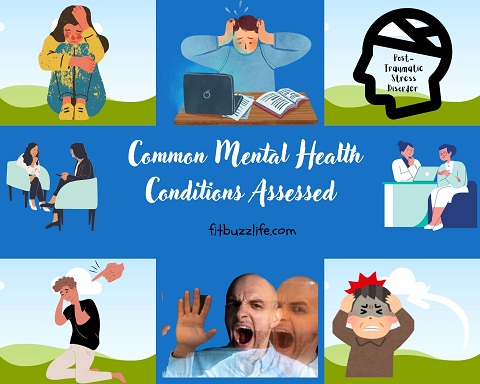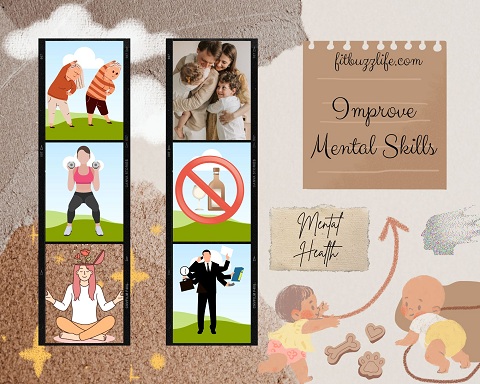Mental health is a fateful aspect of overall well-being, yet it often remains overlsee. Conducting a thorough mental health evaluation is essential for diagnosing and addressing multiple psychological conditions. This guide provides an in-depth look at the process, criteria, and significance of mental health evaluations, offering valuable insights for both professionals and individuals seeking to understand their mental health better.
A mental health evaluation is a comprehensive assessment designed to diagnose mental health disorders. It involves various methods, including interviews, questionnaires, personality test and standardized tests, to gather detailed information about an individual’s psychological state.
Importance of Mental Health Evaluations
Early Diagnosis and Treatment
Early diagnosis through mental health evaluations can significantly improve treatment outcomes. Identifying mental health issues at an early stage allows for timely intervention, which can prevent the progression of the disorder and enhance the individual’s quality of life.
Personalized Treatment Plans
Mental health evaluations provide a detailed understanding of an individual’s specific needs, enabling healthcare providers to develop personalized treatment plans. These plans are tailored to address the unique symptoms and circumstances of each patient, ensuring more effective and targeted care.
Improved Self-Awareness
Undergoing a mental health evaluation can enhance an individual’s self-awareness. Understanding one’s mental health status can empower individuals to take proactive steps in managing their mental health and seeking appropriate support when needed.
Components of a Mental Health Evaluation
Clinical Interview
The clinical interview is a fundamental component of the mental health evaluation process. During this interview, a mental health professional engages in a structured conversation with the individual to gather comprehensive information about their psychological history, symptoms, and life circumstances.
Topics Covered in a Clinical Interview
- Presenting Concerns: Current symptoms and issues that prompted the evaluation.
- Psychiatric History: Previous diagnoses, treatments, and hospitalizations.
- Medical History: Physical health conditions and medications.
- Family History: Mental health issues within the family.
- Social History: Relationships, social support, and lifestyle factors.
- Substance Use: History of alcohol or drug use.
Psychological Testing
Psychological tests are standardized tools used to measure various aspects of an individual’s mental health. These tests can assess cognitive functions, personality traits, and specific psychological conditions.
Types of Psychological Tests
- Cognitive Tests: Assess intellectual functioning and cognitive abilities.
- Personality Tests: Evaluate personality traits and behavioral tendencies.
- Symptom Checklists: Measure the severity of specific symptoms, such as depression or anxiety.
Behavioral Observations
Behavioral observations involve monitoring an individual’s behavior in different settings to gather additional information about their mental health. These observations can provide valuable insights into how the individual interacts with their environment and others.
Collateral Information
Gathering information from collateral sources, such as family members, friends, or teachers, can enhance the accuracy of a mental health evaluation. These sources can provide a different perspective on the individual’s behavior and symptoms.
Common Mental Health Conditions Assessed

Depression
Depression is characterized by persistent feelings of sadness, hopelessness, and a lack of interest in activities. Mental health evaluations assess the severity and impact of depressive symptoms to guide treatment.
Causes and Risk Factors
Depression can be caused by a combination of genetic, biological, environmental, and psychological factors. Risk factors include family history, traumatic experiences, chronic medical conditions, and substance abuse.
Symptoms of Depression
- Persistent sadness or low mood
- Loss of interest in hobbies and activities
- Changes in appetite and weight
- Sleep disturbances (insomnia or hypersomnia)
- Fatigue and lack of energy
- Difficulty concentrating
- Feelings of worthlessness or guilt
- Thoughts of death or suicide
Anxiety Disorders
Anxiety disorders encompass various conditions characterized by excessive fear and worry. Evaluations focus on identifying specific anxiety disorders, such as generalized anxiety disorder, panic disorder, or social anxiety disorder.
Causes and Risk Factors
Anxiety disorders can be triggered by genetic, environmental, and psychological factors. Stressful life events, trauma, and a family history of anxiety can increase the risk.
Symptoms of Anxiety Disorders
- Restlessness and feeling on edge
- Rapid heartbeat and palpitations
- Sweating and trembling
- Shortness of breath
- Nausea and dizziness
- Difficulty concentrating
Bipolar Disorder
Bipolar disorder involves episodes of mania and depression. Mental health evaluations help differentiate bipolar disorder from other mood disorders and establish appropriate treatment plans.
Causes and Risk Factors
The exact cause of bipolar disorder is unknown, but it is believed to involve genetic, biological, and environmental factors. A family history of bipolar disorder and significant life stressors can increase the risk.
Symptoms of Bipolar Disorder
- Manic Episodes: Increased energy, reduced need for sleep, grandiosity, rapid speech, and risky behavior.
- Depressive Episodes: Persistent sadness, fatigue, changes in appetite, and thoughts of suicide.
Schizophrenia
Schizophrenia is a severe mental disorder characterized by hallucinations, delusions, perception, emotional and disorganized thinking. Comprehensive evaluations are crucial for accurate diagnosis and management of schizophrenia.
Causes and Risk Factors
Schizophrenia is believed to result from a combination of genetic, brain chemistry, and environmental factors. Risk factors include a family history of schizophrenia, prenatal exposure to toxins, and early childhood trauma.
Symptoms of Schizophrenia
- Hallucinations (hearing or seeing things that are not there)
- Delusions (false beliefs)
- Disorganized thinking and speech
- Social withdrawal
- Impaired functioning
Post-Traumatic Stress Disorder (PTSD)
PTSD is a condition resulting from exposure to traumatic events. Mental health evaluations assess the presence and severity of PTSD symptoms, facilitating effective treatment strategies.
Causes and Risk Factors
PTSD can develop after exposure to a traumatic event such as a natural disaster, accident, terrorist attack, war/combat, rape, or other violent personal assaults. Risk factors include the severity and proximity of the trauma, lack of social support, and a history of mental health issues.
Symptoms of PTSD
- Intrusive Memories: Recurrent, distressing memories of the traumatic event.
- Avoidance: Avoiding places, people, and activities that remind one of the trauma.
- Negative Changes in Thinking and Mood: Feelings of hopelessness, detachment from friends and family, and loss of interest in activities.
- Changes in Physical and Emotional Reactions: Being easily startled, feeling tense or on edge, and experiencing sleep disturbances.
Obsessive-Compulsive Disorder (OCD)
Obsessive-compulsive disorder (OCD) is characterized by intrusive, unwanted thoughts (obsessions) and repetitive behaviors or mental acts (compulsions) performed to reduce anxiety.
Causes and Risk Factors
OCD can be influenced by genetic, biological, and environmental factors. A family history of OCD, stressful life events, and certain personality traits can increase the risk.
Symptoms of OCD
- Obsessions: Persistent, intrusive thoughts or urges (e.g., fear of contamination).
- Compulsions: Repetitive behaviors or mental acts (e.g., handwashing, checking) performed to alleviate distress.
The Role of Mental Health Professionals

Psychiatrists
Psychiatrists are medical doctors specializing in mental health. They conduct evaluations, prescribe medications, and provide therapy for various mental health conditions.
Psychologists
Psychologists hold advanced degrees in psychology and are trained in conducting mental health evaluations and providing psychotherapy. They use a range of psychological tests and therapeutic techniques.
Licensed Clinical Social Workers (LCSWs)
LCSWs provide mental health services, including evaluations and therapy. They often work in collaboration with other mental health professionals to deliver comprehensive care.
Counselors and Therapists
Counselors and therapists offer support and treatment for mental health issues. They play a key role in conducting initial evaluations and ongoing therapy sessions.
Preparing for a Mental Health Evaluation
Gathering Relevant Information
Before the evaluation, individuals should gather relevant information about their medical history, previous mental health treatments, and any current medications. This information will help the mental health professional conduct a thorough assessment.
Being Honest and Open
Honesty and openness during the evaluation are crucial for an accurate diagnosis. Individuals should feel comfortable sharing their thoughts, feelings, and experiences with the mental health professional.
Asking Questions
Individuals should feel empowered to ask questions about the evaluation process, potential diagnoses, and treatment options. This can help them better understand their mental health and the steps they can take to improve it.
How to Improve Mental Skills

Improving mental skills is essential for maintaining cognitive health, enhancing problem-solving abilities, and fostering overall mental well-being. Here are some effective strategies to boost your mental skills:
Engage in Regular Mental Exercise
- Puzzles and Brain Games: Activities like crosswords, Sudoku, and memory games can sharpen cognitive functions.
- Reading and Writing: Regularly reading books, articles, and writing can enhance comprehension and critical thinking.
- Learning New Skills: Take up a new hobby or learn a new language to challenge your brain.
Maintain Physical Health
- Exercise Regularly: Physical activity increases blood flow to the brain and promotes the growth of new neural connections.
- Balanced Diet: Consuming a diet rich in fruits, vegetables, whole grains, and lean proteins provides essential nutrients for brain health.
- Adequate Sleep: Ensure you get enough sleep to help your brain consolidate memories and rejuvenate.
Practice Mindfulness and Meditation
- Mindfulness: Techniques like mindfulness meditation can improve focus, reduce stress, and enhance emotional regulation.
- Deep Breathing Exercises: Practicing deep breathing can help calm the mind and improve concentration.
Social Interaction
- Stay Connected: Engaging in social activities and maintaining relationships can stimulate your brain and improve mental acuity.
- Join Clubs or Groups: Participate in group activities or clubs related to your interests to keep your mind active and engaged.
- Keep Your Commitment: Think before you speak and try to speculation every word. Stay away from lies and try to implement your promise succesfully.
- Talk Openly: Try to spend more time with friends as well as your familes and try to more talk openly with loved ones. That will help to increase the mental perfrmance.
Manage Stress
- Relaxation Techniques: Practices such as yoga, and progressive muscle relaxation can reduce stress and improve mental clarity.
- Time Management: Keep in mind importance of time in every step of every work effective time management can help reduce stress and improve productivity.
Stay Curious and Keep Learning
- Continuous Education: Take courses or attend workshops to keep your mind engaged and continuously learning.
- Explore New Ideas: Stay open to new experiences and ideas to keep your brain flexible and adaptable.
Limit Alcohol and Avoid Drugs
- Moderate Alcohol Consumption: Excessive alcohol can impair cognitive functions, so it’s important to drink in moderation.
- Avoid Drugs: Recreational drug use can negatively impact brain health and cognitive abilities.
- Ignore somking: Try to avoid smoking because smoking damages the lungs function as well as disrupts sleep which interferes with mental health development.
FAQs about Mental Health Evaluation
While many mental disorders cannot be “cured” in the traditional sense, they can often be effectively managed with a combination of therapy, medication, and lifestyle changes. Early intervention and ongoing treatment can help individuals lead productive and fulfilling lives.
Genetics can play a significant role in the development of mental disorders. However, environmental factors, life experiences, and individual psychological makeup also contribute to the onset of these conditions.
Treatments for mental disorders include psychotherapy (such as cognitive-behavioral therapy), medications (such as antidepressants or antipsychotics), lifestyle changes, and support from friends, family, and support groups. The specific treatment plan depends on the individual’s condition and needs.
Mental proficiency refers to an individual’s ability to effectively and efficiently use cognitive skills to perform tasks and solve problems. It encompasses a range of mental abilities, including memory, attention, reasoning, problem-solving, and decision-making. High mental proficiency means being adept at understanding complex information, learning new skills quickly, and applying knowledge in practical situations.
Conclusion
A comprehensive mental health evaluation is a vital step in understanding and addressing mental health issues. By identifying specific conditions and tailoring treatment plans to individual needs, mental health evaluations play a crucial role in promoting overall well-being.
